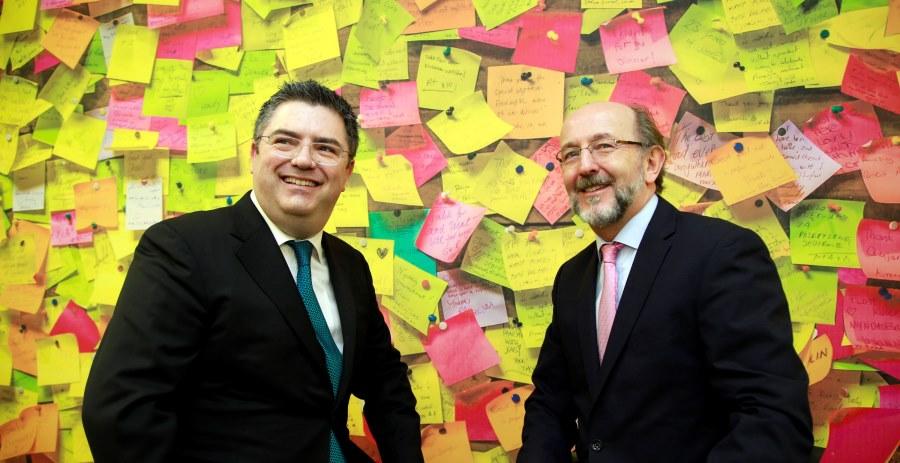

DCU joins forces with INTEL to foster talent and develop advanced technologies
Dublin City University and INTEL have today signed an agreement which will see the two organisations collaborate on talent development and on technologies that have the potential to transform how we live, learn, work and engage with the arts in the future.
Building on more than two decades of partnership between DCU and Intel, the two organisations have now formalised their relationship and identified joint areas of interest for greater collaboration in research and innovation, shaping public policy in key areas and the development of future talent.
Key areas of research activity will leverage advances in Internet of Things technology and Data Analytics for application in areas such as connected health, water quality management and STEM education innovations. The agreement will also seek to combine the creative arts and design with technology in the next wave of Irish innovation.
Highlighting the potential of this enhanced partnership, Eamonn Sinnott, General Manager, Intel Ireland and Vice President of Intel’s Technology Manufacturing Group said,
“At Intel we have been proactively developing our advanced manufacturing capability, together with a design, research and innovation footprint in Ireland over the last 27 years. This development has been underpinned by the strong relationships we have built with academic institutions and the innovation community across Ireland. The signing of this memorandum today signals a new strategic approach to our engagement with DCU which will consolidate and build on our existing relationship and pave the way for exciting new collaborations.”
Collaborations between DCU and Intel run the spectrum from research in the development of plasma diagnostics to improve computer chip manufacturing processes (led at DCU by Professor Miles Turner) through to the identification of new materials for integration into future device fabrication protocols (undertaken at DCU by Professor Greg Hughes).
More recently, DCU’s Smart Stadium project led at DCU by Professor Noel O’Connor has used Intel Internet of Things technology platforms within Croke Park, enhancing the fan experience by providing data such as player performance metrics, pitch quality, stadium microclimate, queueing times at retail and refreshment outlets, and traffic details to and from the stadium. In addition, the deployed instrumentation enables Croke Park to be used as a test-bed for technologies that mode the stadium as a SMart City in microcosm.
DCU and Intel will also collaborate on efforts to shape policy in relation to sustainability (eg water quality management) ageing (the use of digital technologies to enhance independent living) and education (how Edtech can harness technology to enhance STEM learning). In a national drive to cultivate a STE(A)M (Science, Technology, Engineering, Arts, Maths) approach to innovation, DCU and Intel will also host an annual STE(A)M student hackathon.
In moves to secure talent for these future developments, Intel will also offer 16 Engineering Masters student bursaries each year to a total value of €96 000 in areas such as plasma science, vacuum technology and sustainable energy systems.
Professor Brian MacCraith, President of DCU said,
“DCU is extremely proud of its longstanding links with Intel, one of the great innovators in technology globally. Both organisations are committed to fostering the development of creative talent and our respective research interests intersect and overlap in areas that have the potential to transform lives and societies. We are excited that the formalisation of our relationship today will allow for further opportunities to embrace the creative arts as drivers of the next wave of economic growth in this country.”
About Intel at DCU
DCU’s Smart Stadium project is using Croke Park as a test bed to trial smart technologies which can help cities to function smarter. Intel’s end-to-end IoT portfolio, including Intel® IoT gateways based on the Irish designed and produced Intel® Quark™ processor, is being used to facilitate the research and pilot deployments.
Intel is a founding member of the Irish Centre for Cloud Computing and Commerce (IC4). Intel has participated in numerous IC4-funded projects, particularly in the area of cloud scalability. Through their collaboration with IC4, Intel is a partner on two 4m Horizon 2020 projects through their collaboration with IC4 - CloudLightning and RECAP - which are designed to dramatically reduce the costs of cloud service provision and increase the performance of cloud computing.
Shimmer Research is an Irish R&D at the forefront of the provision of wearable wireless sensors in the world. Based in DCU Alpha Innovation Campus, the company designs, develops and manufactures a full range of wearable wireless sensors including kinematic, bio-physical, and ambient modules – paving the way for the next big wave in computing. The Shimmer platform was originally developed by Intel Research Labs in 2006, and Shimmer Research was established in 2008 following a worldwide licensing agreement.
Firmwave, another DCU Alpha company, has developed Firmwave® Edge, the first low-power, wireless sensor network platform powered by the latest Intel® Quark™ microcontroller technology.
